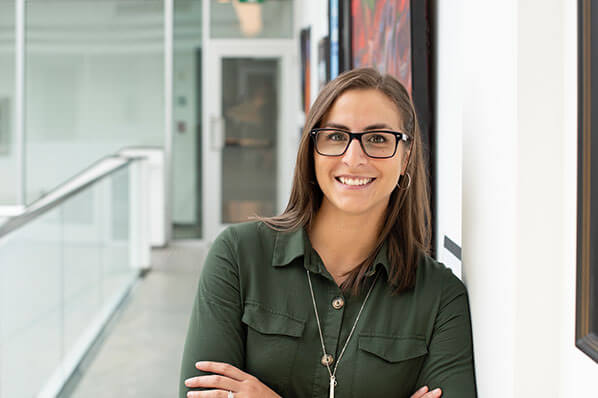REFERRAL PERKS®
For a limited time, earn $200* for you and your friend for every successful referral.
For a limited time, earn $200* for you and your friend for every successful referral.
Learn how an FHSA helps you save for your first home faster.
Learn which savings option is the best for your financial goals.
Explore this step-by-step complete guide to starting a business in British Columbia.
We’ve rounded up 10 of the most common scams — along with ways to identify and outsmart them.

Kylaina Afonso is the Assistant Branch Manager for our Downtown Kelowna Branch. We caught up with Kylaina and she shared with us her savings habits, how they started and where they're taking her.
Put money aside before you start spending it — the same day as payday after your bills are paid, if possible.
When I grew up, any money I got for birthdays or chores was split 75/25 (75% went to savings, 25% was fun money).
As I got older, I figured out how much I needed between paycheques ($200 every two weeks in high school covered my gas, lunch money, and movies/shopping). The rest of my paycheque went straight to savings. I was really rigid with myself, too, so if I had some money left over from the week prior, I only put the difference in my chequing account to bring it up to $200. Extra savings without having to change my habits!
I have signed up for the Group RRSP at work (which not enough people take advantage of!) and I have an automated transfer leave my account on payday to my personal RRSP, TFSA (both of which are invested and earning interest without any effort) and savings accounts.
I have a savings account for my current goals (see below), one for emergencies and a savings account for my bills. Each pay check, I put the same amount aside and, if at the end of my pay period there's anything left over, I usually place it into the account I need more money in. So if it was an expensive month, I'd pop those extra funds into my bills account.
Related reading: The Complete Guide to TFSAs | Benefits of your RRSP
I look at my regular savings like a bill that needs to be paid each month: non-negotiable. If I have extra money left over in my budget once the bills are paid, I top up my savings.
My wedding! I have a separate savings account called “wedding” where my fiancé and I put funds towards each payday. It’s easy to keep these funds separate and see the growth!
When I started saving for it, I cut back on dining out and alcohol. If I did go to a restaurant, I would have an iced tea or stick with water instead. I stopped going out for lunch during the work week (#baggedlunch all the way!). Also, I don't spend my own money at Starbucks: I will only go get a coffee if I have received a gift card for my birthday or otherwise. Lastly, I stopped dyeing my hair. This saved me $150 per trip to the hair dresser which ends up being about $450 a year!
Once I pick out my destination and date I’d like to travel, I count the number of paycheques I will receive in between today and my travel date. From there, I calculate how much I need to save in order to afford this vacation (this includes spending money and food).
Too hard to save that much each paycheque? Perhaps I need to cut back other things like eating out, shopping, etc (if the travel is non negotiable) or simply push my travel date. I also try to keep some residual savings in case I want to have a spontaneous weekend away!
Money adds up faster than you think. Start early, and often, even if it’s small. As you can, over time, increase these regular savings — you’ll hardly notice the difference in your day-to-day spending and you’ll feel a lot better knowing you have the money to pay for things you want and need!
A lot of people are taught savings habits growing up. Some manage to figure it out on their own, but a lot don’t. It’s harder to start a new habit once bills and other expenses come into play, especially when living in an expensive city like Kelowna.
So start the savings habit first. That way, working around it makes it less of a burden or setback to whatever lifestyle you’ve become accustomed to.
Want more advice like this? Check out Kylaina's 11 tips to help you stick to your budget.
You don't have to build your financial plan alone. Our financial advisors have the experience and the expertise to help you create a plan so you can reach your financial goals. Book a financial snapshot and start your tomorrow today.
Everything is easier with a little help.
We acknowledge that we have the privilege of doing business on the traditional territory of First Nations communities.
© First West Credit Union. All rights reserved.
Proudly Canadian